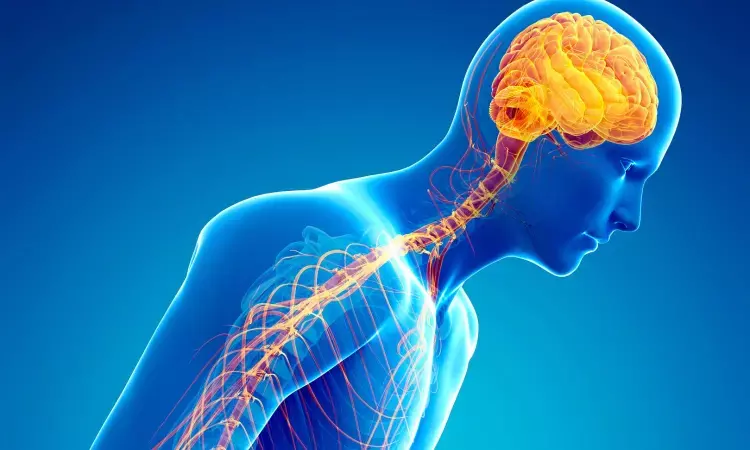- Home
- Medical news & Guidelines
- Anesthesiology
- Cardiology and CTVS
- Critical Care
- Dentistry
- Dermatology
- Diabetes and Endocrinology
- ENT
- Gastroenterology
- Medicine
- Nephrology
- Neurology
- Obstretics-Gynaecology
- Oncology
- Ophthalmology
- Orthopaedics
- Pediatrics-Neonatology
- Psychiatry
- Pulmonology
- Radiology
- Surgery
- Urology
- Laboratory Medicine
- Diet
- Nursing
- Paramedical
- Physiotherapy
- Health news
- Fact Check
- Bone Health Fact Check
- Brain Health Fact Check
- Cancer Related Fact Check
- Child Care Fact Check
- Dental and oral health fact check
- Diabetes and metabolic health fact check
- Diet and Nutrition Fact Check
- Eye and ENT Care Fact Check
- Fitness fact check
- Gut health fact check
- Heart health fact check
- Kidney health fact check
- Medical education fact check
- Men's health fact check
- Respiratory fact check
- Skin and hair care fact check
- Vaccine and Immunization fact check
- Women's health fact check
- AYUSH
- State News
- Andaman and Nicobar Islands
- Andhra Pradesh
- Arunachal Pradesh
- Assam
- Bihar
- Chandigarh
- Chattisgarh
- Dadra and Nagar Haveli
- Daman and Diu
- Delhi
- Goa
- Gujarat
- Haryana
- Himachal Pradesh
- Jammu & Kashmir
- Jharkhand
- Karnataka
- Kerala
- Ladakh
- Lakshadweep
- Madhya Pradesh
- Maharashtra
- Manipur
- Meghalaya
- Mizoram
- Nagaland
- Odisha
- Puducherry
- Punjab
- Rajasthan
- Sikkim
- Tamil Nadu
- Telangana
- Tripura
- Uttar Pradesh
- Uttrakhand
- West Bengal
- Medical Education
- Industry
Transdermal nicotine treatment fails to slow progression of early Parkinson's disease

The transdermal continuous Nicotine in a dose of up to 28 mg/day for a year does not slow the progression of early Parkinson's disease, according to an original article published in NEJM Evidence.
The lead author of this study, “Transdermal Nicotine Treatment and Progression of Early Parkinson’s Disease,” is Wolfgang H. Oertel, M.D.
Based on the data from Epidemiologic studies, smokers have a lower incidence of Parkinson’s disease. It has been hypothesized that Nicotine slows the progression of early Parkinson’s disease.
Researchers randomly assigned patients with Parkinson’s disease who were diagnosed within 18 months (Hoehn and Yahr disease stage less than or equal to 2, therapy naïve and not requiring dopaminergic therapy, to transdermal Nicotine or placebo.)
The primary endpoint was a change in the Unified Parkinson’s Disease Rating Scale parts I–III (Total UPDRS) score between baseline and 60 weeks.
Summary of important clinical points includes:
- Among 163 participants, 101 were assessed for the primary endpoint. In the placebo versus nicotine group, the mean worsening of Total UPDRS was 3.5 versus 6.0, respectively.
- For the first secondary endpoint, in the placebo versus nicotine group, analysis of 138 participants showed a mean worsening of 5.4 versus 9.1
- The causes of Dropout were early treatment discontinuation and adverse events.
- At the site of patch applications, Cutaneous adverse effects were common.
- During participation, 34.6% of participants initiated dopaminergic therapy.
They noted one-year transdermal nicotine treatment did not slow the progression of early Parkinson’s disease.
As acknowledged, the study was funded by the Michael J. Fox Foundation for Parkinson’s Research and others.
BDS, MDS in Periodontics and Implantology
Dr. Aditi Yadav is a BDS, MDS in Periodontics and Implantology. She has a clinical experience of 5 years as a laser dental surgeon. She also has a Diploma in clinical research and pharmacovigilance and is a Certified data scientist. She is currently working as a content developer in e-health services. Dr. Yadav has a keen interest in Medical Journalism and is actively involved in Medical Research writing.
Dr Kamal Kant Kohli-MBBS, DTCD- a chest specialist with more than 30 years of practice and a flair for writing clinical articles, Dr Kamal Kant Kohli joined Medical Dialogues as a Chief Editor of Medical News. Besides writing articles, as an editor, he proofreads and verifies all the medical content published on Medical Dialogues including those coming from journals, studies,medical conferences,guidelines etc. Email: drkohli@medicaldialogues.in. Contact no. 011-43720751


